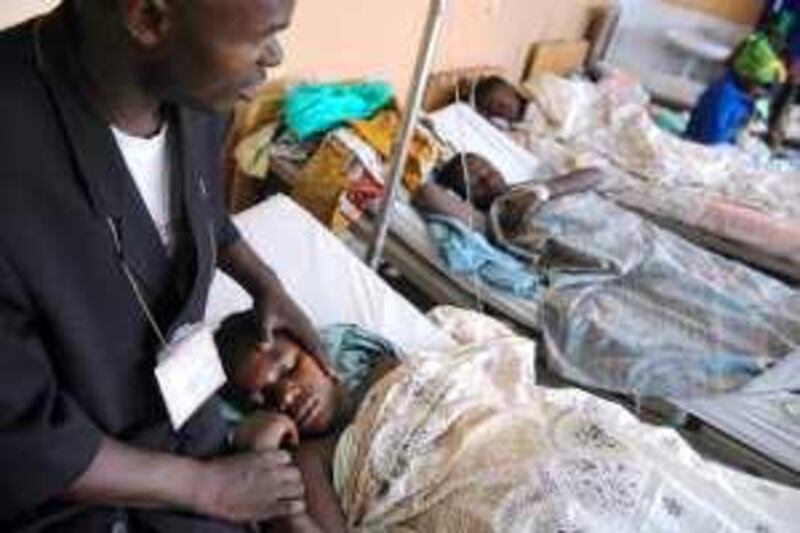NEW YORK // Responding to brutal rape sprees during political turmoil in Guinea, Kenya and the Democratic Republic of Congo, members of the UN Security Council edged towards tougher policies on tackling sexual violence during wars and instability, last week. Margot Wallström, the UN's recently appointed envoy on sexual violence in conflict, urged council members to tackle a scourge that has seen countless women violated during eras of instability and violence "from the Trojan War to the nuclear age".
But human rights groups accuse the 15-nation body of dawdling on the issue for the past decade and warned that its failure to grasp the issue was leaving women in turbulent areas at ongoing risk of rape and other forms of sex attack. They point to the scores of women who suffered rape, mutilation and sex slavery during an opposition protest in September last year. The atrocities occurred in a stadium in the Guinean capital, Conakry, at the hands of forces loyal to the military junta leader, Captain Moussa Dadis Camara. Women and girls were carried away to barracks and officers' homes to serve as sex slaves for several days, according to UN reports. Others were raped at the scene. Some suffered hideous assaults with rifles.
Incidents of rape shot up during the post-election violence in Kenya at the end of 2007. Kathleen Cravero, from the UN Development Programme, declared at the time that "battles are fought on women's bodies as much as on battlefields". Ms Wallström, fresh from visiting Congo last month, described the turbulent African nation as "the rape capital of the world", with about 8,000 women raped by soldiers or militia members in the country's east last year.
"While the Congo's mothers, daughters and sisters walk in shame, their rapists walk free. Victims are doubly victimised by this injustice," Ms Wallström told council members last Tuesday. "Yet Congo has a robust legal framework and a zero tolerance declaration ? the laws must be implemented and the strategy made operational," she said. The statistics are shocking: about 14 women are sexually assaulted in the Congo daily - with 1,244 violated during the first three months of this year, according to the UN. Over the past 14 years, through some of the country's most violent recent history, at least 200,000 cases of sexual violence have been recorded.
Attempts to combat widespread acts of rape during wartime have gathered momentum over recent years, with sexual violence during the Rwandan genocide of 1994 and the Bosnian War in the early 1990s catalysing efforts to prosecute those behind the atrocities. According to Ms Wallström, rape is not simply committed randomly by soldiers in "the fog of war", but is often a deliberate and orchestrated policy during conflict "aimed to destroy not only people, but their sense of being a people".
"Rule by rape is used by political and military leaders to achieve political, military and economic ends," said Ms Wallström, a former Swedish MP. "Such crimes present a security crisis that demands a security response." Seeking to "plug gaps" in international efforts against war-time rape, Ms Wallström called for more data on such crimes and the creation of a "list of shame" of armies and militias that used forced sex during military offensives.
Peacekeeping patrols to protect women collecting firewood in Sudan's western province of Darfur, and a similar scheme to escort their Congolese counterparts safely to marketplaces, have reduced incidents of rape, said Ms Wallström, but such "ad hoc methods ? must be replaced by systematisation". The Security Council needs to build the protection of women into the rules it lays out for peacekeeping operations, she said, while outlining plans to create an early-warning system that will predict when conflicts are likely to lead to widespread sexual violence.
The UN secretary general Ban Ki-moon's latest report on women and peace and security suggested a set of 26 indicators for Security Council members to use as a basis for preventing and protecting women from rape and other sex attacks during conflict. But council members agreed that the proposals need "technical and conceptual development before they could become operational" and postponed a decision until October, said Yukio Takasu, Japan's UN envoy who held the body's rotating presidency for April.
Marianne Mollmann, the women's rights advocate at the New York-based pressure group, Human Rights Watch, criticised council members for the delay, saying there was "no excuse for waiting another minute to take steps we know are needed". "Women in conflict-ridden countries deserve more than a commitment to collecting data when the Security Council looks at what it has done in the past 10 years to address their plight," she said. "We expect UN member states to follow through to empower women as peacemakers and to stop rape in war."
@Email:jreinl@thenational.ae






